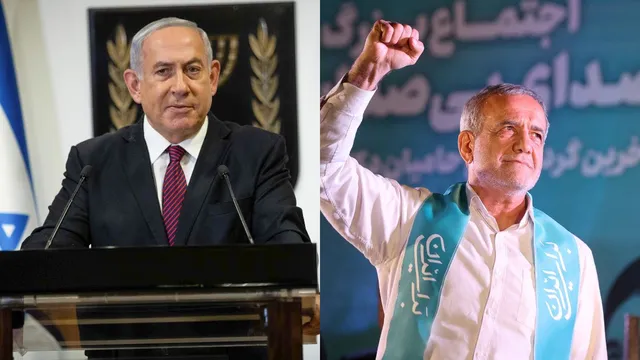- By Vivek Raj
- Sun, 04 Aug 2024 11:48 AM (IST)
- Source:JND
The recent assassination of Hamas leader Ismail Haniyeh in Tehran, following Israel's killing of Hezbollah’s military chief Fuad Shukr in Beirut, has escalated tensions in the Middle East. Both Iran and its allies, including Hezbollah, have vowed retaliation, with Hezbollah ramping up attacks against Israel. In response, the US is boosting its military presence in the region with an aircraft carrier strike group and additional defense resources. Israeli Defence Minister Yoav Gallant is working with US and UK counterparts to prepare for potential Iranian retaliation, increasing the risk of a larger conflict in the region.
Netanyahu’s Abraham Alliance
Recently, Israeli Prime Minister Benjamin Netanyahu proposed the formation of the "Abraham Alliance." This proposed coalition, an expansion of the Abraham Accords, aims to unify countries with diplomatic relations with Israel against Iran’s regional influence. Netanyahu envisions that this alliance would address Iran's influence and its network of proxy forces collectively known as the "Axis of Resistance".
The Abraham Accords date back to 2020 which normalised relations between Israel and several Arab nations, including the United Arab Emirates (UAE), Bahrain, Morocco, and Sudan. The proposed Abraham Alliance seeks to extend these accords by incorporating current and future diplomatic partners of Israel, enhancing collective security against Iran’s regional ambitions.
The Axis of Resistance: Iran's Network Of Proxies
Since the Islamic Revolution of 1979, Iran has expanded its influence through a network of proxy groups known as the Axis of Resistance. This network includes:
Lebanon: Hezbollah
Hezbollah, established in the early 1980s with Iranian support, has evolved into a significant military and political force in Lebanon, which shares Tehran's Shiite Islamist ideology. It is armed and funded by the Iranian Revolutionary Guard Corps (IRGC) and possesses a large arsenal of rockets and missiles.
Gaza: Hamas and Palestinian Islamic Jihad
In Gaza, Iran supports militant groups like Hamas and the Palestinian Islamic Jihad (PIJ), which have been involved in ongoing conflicts with Israel.
Syria: Assad Regime
Iran’s alliance with the Syrian government under Bashar al-Assad has been pivotal since the Syrian civil war began in 2011. Iran has provided military support and organised Shiite militias to bolster Assad’s forces.
Yemen: The Houthis
The Houthi movement in Yemen, backed by Iran, has become a key player in regional conflicts. The Houthis have received significant military and financial support from the IRGC.
Iraq: Shiite Militias
In Iraq, Iran has supported various Shiite militias, such as Kataib Hezbollah and Asaib Ahl al-Haq, which have targeted US forces and maintain close ties with Tehran.

